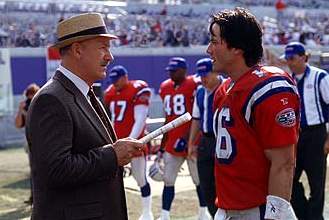Jimmy McGinty: You know what separates the winners from the losers?
Shane Falco: The score.
-- from
The Replacements
 Seeing one of my favorite sports-cliché films again,
this time in French (welcome to Montreal!) prompts me to
continue my recent series of posts on student attitudes with
an entry I've had in my "to write" queue for a few weeks.
The April 13 issue of the
The Chronicle of Higher Education
contained an interesting article by
Walter Tschinkel,
a biology prof at Florida State University, called
Just Scoring Points.
(Hurry to read the full article now... The Chronicle has let
down its pay wall through May 8.)
Tschinkel argues that the common metaphors we use for teaching
and learning -- filling empty vessels and building an edifice
-- lead us in the wrong direction from how students actually
think. He offers instead a sports metaphor:
Seeing one of my favorite sports-cliché films again,
this time in French (welcome to Montreal!) prompts me to
continue my recent series of posts on student attitudes with
an entry I've had in my "to write" queue for a few weeks.
The April 13 issue of the
The Chronicle of Higher Education
contained an interesting article by
Walter Tschinkel,
a biology prof at Florida State University, called
Just Scoring Points.
(Hurry to read the full article now... The Chronicle has let
down its pay wall through May 8.)
Tschinkel argues that the common metaphors we use for teaching
and learning -- filling empty vessels and building an edifice
-- lead us in the wrong direction from how students actually
think. He offers instead a sports metaphor:
When you play a sport, your preparation reaches a crescendo just before a match (exam). If you win the match (exam), you get points (grades) in proportion to your placement. You keep track of those points, strategizing about how to get more next time. The match leaves no residue other than the points. At the end of college, you enter the working world with your overall standing (grade-point average) and little more.The metaphor isn't perfect, but it doesn't need to be. It only has to offer us some insight we might otherwise not have had. The points analogy explains why so many students want to know, "Is this going to be on the test?", and why a study guide prepared by the teacher is more appealing than a study guide they prepare for themselves. It accounts for how this semester so many students can not know something they demonstrated knowing just last semester. And worse -- or should I say "better"!? -- this metaphor may give us insight into how we instructors contribute to the problem in how we ask questions, assign work, and evaluate our students' performance. We treat grades like times in a track meet or points on the basketball court,so why shouldn't our students. Maybe they are just adapting to the strange world we immerse them in. If we focused on competencies instead, they might take the knowledge they might accrue more seriously, too. This article offered another near-coincidence with my recent blogging, related to my observation about lack of internalization. Tschinkel describes giving a pop quiz on material he covered meticulously and unambiguously in a previous lecture. Only a quarter of his students knew the answer. He explained the material again and then gave them another pop quiz the next session. 35 percent. He explained the material yet again and gave them another pop quiz a week later. The result? 60 percent -- the same percentage who answered the same question on the final exam. That was in his freshman course; in his upper-division course, everyone finally gave the right answer -- on the fourth iteration. Sigh. My experiment turned out better. Every student in my programming languages course ran short of time on their third scheduled quiz. I decided that it was better to find out what they know than to find out only that they needed more time, so when they arrived for our next class I handed them their quiz papers unannounced and gave them 15 more minutes to finish their answers. I told them that they were also free to change any answer they wished, even if they had gone home to look the answer in the meantime. That seemed like a net win: to score those points, students would have had to care enough to look up the answers after the fact! All but one student put their unexpected time to good use, and quiz scores turned out pretty well. Not as well as I might have hoped, but better. Tschinkel's prescription is one most of us already know is good for us, even if we don't always practice what we know: stop lecturing all the time, ask students questions that require understanding to answer, and integrate material throughout our curriculum rather than teaching a bunch of artificially stand-alone courses. Reading, writing, and discussing material takes more time, so we will probably cover less content, but remember: that's okay. Our students might actually learn more. Sometimes a fun little movie can be more than sugar. It can remind us of an unexamined metaphor we live by. Even if it does so in French:
Vous savez ce qui sépare les gagnants des perdants? Les points.(No, I don't speak French, but Google does.) -----